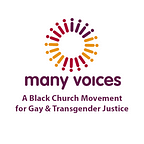Affirming LGBTQ People in the Black Church
By Minister Andrea Noel, M.Div., M.A.
The Rev. Melissa N. McQueen, Many Voices’ North Carolina Faith Organizer, asked powerful ministers to share their wisdom on urgent issues of justice for a new era of challenge and opposition. Throughout American history, sermons by visionary ministers have long played a powerful role in the fight for justice. Intentionally bold and thought-provoking, these especially commissioned sermons embody the spirit of resistance found in truly revolutionary rhetoric. Each sermon represents the sole view of the minister who composed it. For the seventh entry in our Revolutionary Rhetoric series, we feature Minister Andrea Noel’s powerful sermon on affirming LGBTQ people in the Black Church. Minister Noel’s testimonial bristles with courage and insight as she shares her own personal struggle toward self-affirmation as an Afro-Caribbean-American same-gender-loving woman.
Much of the pain and suffering LGBTQ African American men and women experience in theologically conservative churches happens in silence and secret. Some LGBTQ congregants do not even recognize the source of their pain, because sexuality, let alone non-heterosexuality, is not discussed or taught in many African American churches.
Black LGBTQ men and women are often unaware that some of their experiences of emotional and/or psychological pain comes from the heterosexist messages around them and the internalization of these messages. “Heterosexism” is discrimination against LGBTQ people fueled by the assumption that male-dominated heterosexuality is the most “normal” sexual orientation. Consequently, many African American men and women who are LGBTQ suffer alone, unaware that the genesis of their suffering may well lay in the one place they seek solace and refuge.
Whether an African American congregation holds the religious view of “don’t ask, don’t tell,” “love the sinner, hate the sin” or “God hates non-heterosexuals,” Black individuals who are LGBTQ encounter varying degrees of rejection, shame, fragmentation, isolation, and/or depression. Indeed, these were all pervasive feelings in my own experience. I rejected myself in order to conform to Christian doctrine, and this self-rejection led to depression, low self-esteem, self-hate, anxiety, hospitalization, and suicidal ideation.
I am a 34-year-old female with Afro-Caribbean-American roots. I was born in Selma, Alabama, and raised in San Fernando, Trinidad West Indies. The Roman Catholic Church in Trinidad and Tobago is predominantly Black, and its doctrine largely marginalizes the lives of persons who are LGBTQ. Throughout my childhood, I was raised in an extremely homophobic culture reflection in my theologically conservative denomination and home. When I returned to the United States as a teenager, I moved to yet another homophobic community in South Georgia, located well within the Southern “Bible-belt.”
My experiences in both Trinidad and Georgia fundamentally influenced my struggles with openly owning and living my homosexual identity for fear of condemnation and isolation from my family and peers. I also felt spiritually convicted because my embedded theology taught me that homosexuality was sinful and unnatural. My fears and spiritual convictions led me to live a heteronormal life well into young adulthood. My cultural and religious influences initially convinced me that my same-sex attractions were mere immoral desires that should be disregarded.
Belonging to churches that preached against homosexuality and growing up in cultures that were predominantly homophobic negatively impacted my self-identification and encouraged me to live a fake identity. Living a lie was complicated and painful — socially, spiritually and psychologically. I fought so hard to live a heteronormal life that I even married and ultimately divorced my ex-husband, causing further damage to myself, as well as to him.
The reality is that there are many African American men and women in our communities, and especially in our churches, who are in pain and at-risk for psychosocial difficulties, psychological maladies, and many other negative effects, all because they are not heterosexual. And since faith is an important part of many African Americans’ identities, all churches should be concerned about Black LGBTQ people who are marginalized and made to feel invisible. As Kelly Brown Douglas states:
It is the responsibility of the entire African American community to support all LGBTQ men and women as we embrace our authentic selves, encouraging us to build whole families and lives physically, psychologically and spiritually.
About the Minister Andrea Noel, M.Div., M.A.:
Minister Andrea Noel, M.Div., M.A is a civil servant in the federal government, artist, entrepreneur and a “consultant to the Church.” Andrea earned a Bachelor of Science in Chemical Engineering and a Master of Divinity from Howard University, as well as a Master of Arts in Spiritual and Pastoral Care from Loyola University in Maryland. Andrea lives in the Washington Metropolitan area with her fiancé and two cats.
Questions, comments, or concerns? Feel free to contact Many Voices | A Black Church Movement for Gay & Transgender Justice at info@manyvoices.org.
